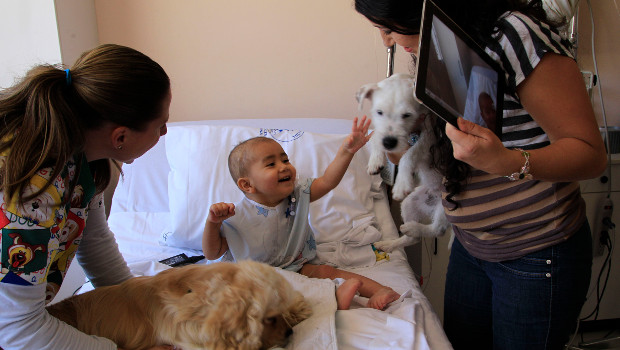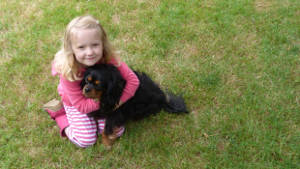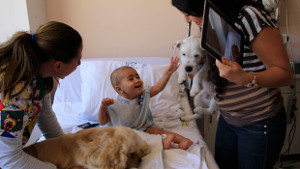Therapy-dog visits for kids with cancer: A safe way to induce smiles?

Studies have shown that hospitalized children may benefit from animal visits.
Being in the hospital is stressful. A new KPWHRI study will see if visits from therapy dogs make the experience easier for pediatric cancer patients.
Jessica Chubak, PhD, studies cancer care, including screening, treatment, and survivorship. One project is particularly close to her heart, though—animal-assisted activities for kids with cancer.
"I volunteered at a pediatric hospital unit after college, and saw how stressful hospital stays can be for children," says Dr. Chubak, an associate investigator at Kaiser Permanente Washington Health Research Institute (KPWHRI). "I know how comforting pets can be, so I thought therapy-animal visits might reduce distress for pediatric patients with cancer."
While leading large studies at KPWHRI on cancer risk factors, treatment outcomes, and research methods, Dr. Chubak found time to investigate animal-assisted activities for children. In these activities, patients get short, fairly unstructured visits from a companion animal (usually a dog) with its owner. "I looked in the scientific literature and found out there were many unanswered questions about the effectiveness and safety of animal-assisted activities," Dr. Chubak says, "especially for children with cancer." Her work is helping to answer those questions.
A promising way to reduce distress
Dr. Chubak and Rene Hawkes from KPWHRI, with Catherine Fiona Macpherson, PhD, RN, CPON at Seattle Children’s Hospital and other collaborators just published the results of their pilot study on therapy-dog visits for children hospitalized for cancer. The report is in the Journal of Pediatric Oncology Nursing. The project was funded by the National Cancer Institute and $5,600 that Dr. Chubak raised through crowdfunding.
The work started with asking young cancer patients, families, and providers about animal-assisted activities. The researchers also surveyed U.S. pediatric oncology hospitals about current practices and concerns about therapy-animal visits. They then studied therapy-dog visits among 19 patients at Seattle Children's Hospital who were an average age of 13. The children received a visit from a therapy dog in their hospital room. Safety procedures included hand sanitization before and after interacting with the animal. Researchers observed the interactions and surveyed patients and providers after visits.
After the dog visit, patients generally had lower distress, worry, tiredness, fear, sadness, and pain. Clinical providers and staff had mainly positive responses. "Our results suggested that the therapy-dog visits may benefit hospitalized kids with cancer, but more rigorous research is needed to be sure," Dr. Chubak says.
Now, Dr. Chubak is launching a larger randomized controlled trial based on the successful pilot study. Her co-investigator is Danielle Zerr, MD, MPH, Seattle Children's Hospital medical director of infection prevention and University of Washington professor and division chief of pediatric infectious diseases. The study is funded by the National Institute of Child Health and Human Development. "Our goal," Dr. Chubak says, "is to learn whether therapy-dog visits can give kids with cancer a better care experience and reduce their distress, and whether microbes are transferred to their hands in the process."
The next step: more children and comparison to controls
Dr. Chubak and her team will study 40 kids with cancer who are patients at Seattle Children's Hospital. Half will get twice-weekly visits from therapy dogs and half will be controls who get usual care, without dog visits. Using surveys, researchers will measure the effects of the animal-assisted activities on patient distress, treatment-related anxiety, and satisfaction with hospital care. Infection prevention is a concern that is often expressed by clinical staff and providers about animal visits, so the study will measure microbial levels on children's hands before and after dog visits.
Dr. Chubak expects to start recruiting children for the study later this year. "We're pleased to be making progress toward improving care for kids with cancer," she says. "What's been especially rewarding, though, are comments from parents in the pilot study. Several said the dog visit was the first time in a long time that they saw their child smile."
Dr. Chubak's recent publication was in collaboration with Seattle Children’s Hospital, with support from a large advisory board of providers, patients, animal-assisted activity volunteers, and researchers, including KPWHRI's Clarissa Hsu, PhD, assistant investigator; Evette Ludman, PhD, senior research associate; and Karen Sherman, PhD, MPH, senior investigator.
The team for the randomized controlled trial includes Evette Ludman, PhD; Jennifer Bobb, PhD, assistant investigator; Rene Hawkes; and Rebecca Ziebell from KPWHRI; and Danielle Zerr; MD; Xuan Qin, PhD; Douglas Hawkins, MD; Amanda Adler; Sarah Steele; and Amin Addetia from Seattle Children's Hospital. Find out more on this topic at the Animals and Health Facebook page.
Animals and Health

Animal-assisted interactions research on Facebook
KPWHRI News

July 2017
- Therapy-dog visits for kids with cancer: A safe way to induce smiles?
- Bike helmets & cycling paths: Reflections from an American in Holland
- Proactive boomers will ‘choose their own adventure’ in growing old
- How can we make advance care planning easier for patients and families?
- Learning Health System initiative weaves research into care delivery at KP Washington
- What young adults with advanced cancer are telling The Clare Project


